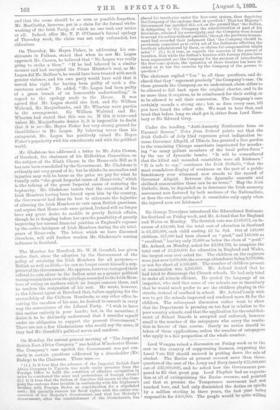On Monday, the annual general meeting of "The Imperial British
East Africa Company " was held at Winchester House. The Company's case against the Government was put con- cisely in certain questions addressed by a shareholder (Mr. Bishop) to the Chairman. These were :— " (1.) Is it true that the advance of the Imperial British East Africa Company to Uganda was made under pressure from the Foreign Office to fulfil the condition of effective occupation in order to counteract the aims and pretensions of foreign rivals P (2.) Is it true that the Sultan of Zanzibar did secure to the Com- pany the customs dues leviable in conformity with His Highness's treaties with Foreign States as consideration for a stipulated rent ; did specially reserve his fiscal rights with the entire con- currence of her Majesty's Government, and that her Majesty's Government, after the establishment of the Protectorate, has placed his territories under the free-zone system, thus depriving the Company of the customs dues in question P That her Majesty's Government has justified this act on the ground that' the Sultan, in delegating to the Company the administration of part of his dominions, retained his sovereignty, and the Company were bound to accept his action without question,' though the previous Govern- ment had recorded their judgment that the Company should be previously consulted as to every act of the Sultanate affecting the territory administered by them, or claims for compensation might arise' ? (3.) Is it true, as regards the exercise of the powers of taxation, that while the Sultan's treaties with foreign States have been superseded qutt the Company for the purpose of introducing the free-zone system, the operation of these treaties has been in- sisted on to bar the exercise by the Company of the powers in question ?"
The chairman replied " Yes " to all these questions, and de- clared that they " represent precisely" the Company's case. On these grounds the Company, as we understand, claim either to be allowed to fall back upon the original charter, and to do no more than it requires, to be reimbursed for their outlay, or to be allowed to sell their concession. The Company's case certainly sounds a strong one ; but so does every case, till you have heard the other side. We want to hear that, and trust that before long we shall get it, either from Lord Rose- bery or Sir Edward Grey.


































 Previous page
Previous page